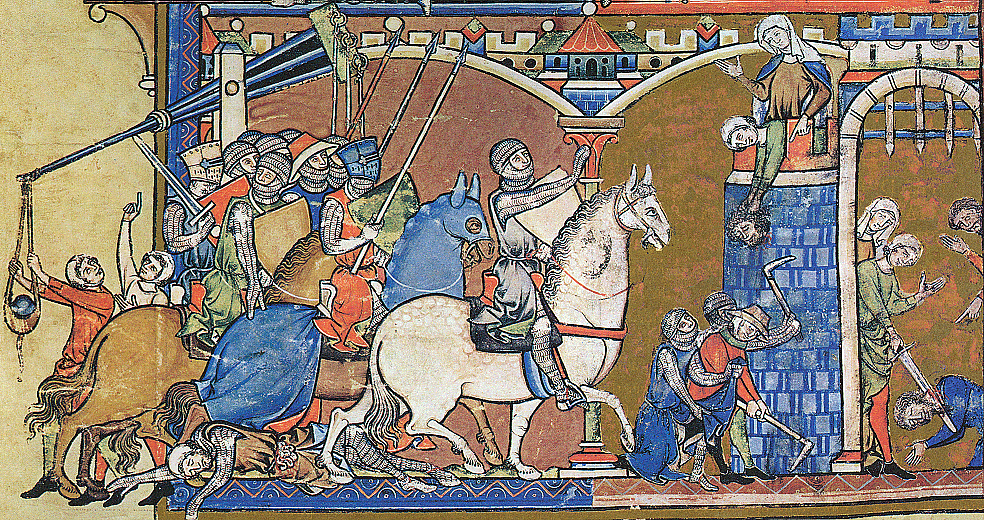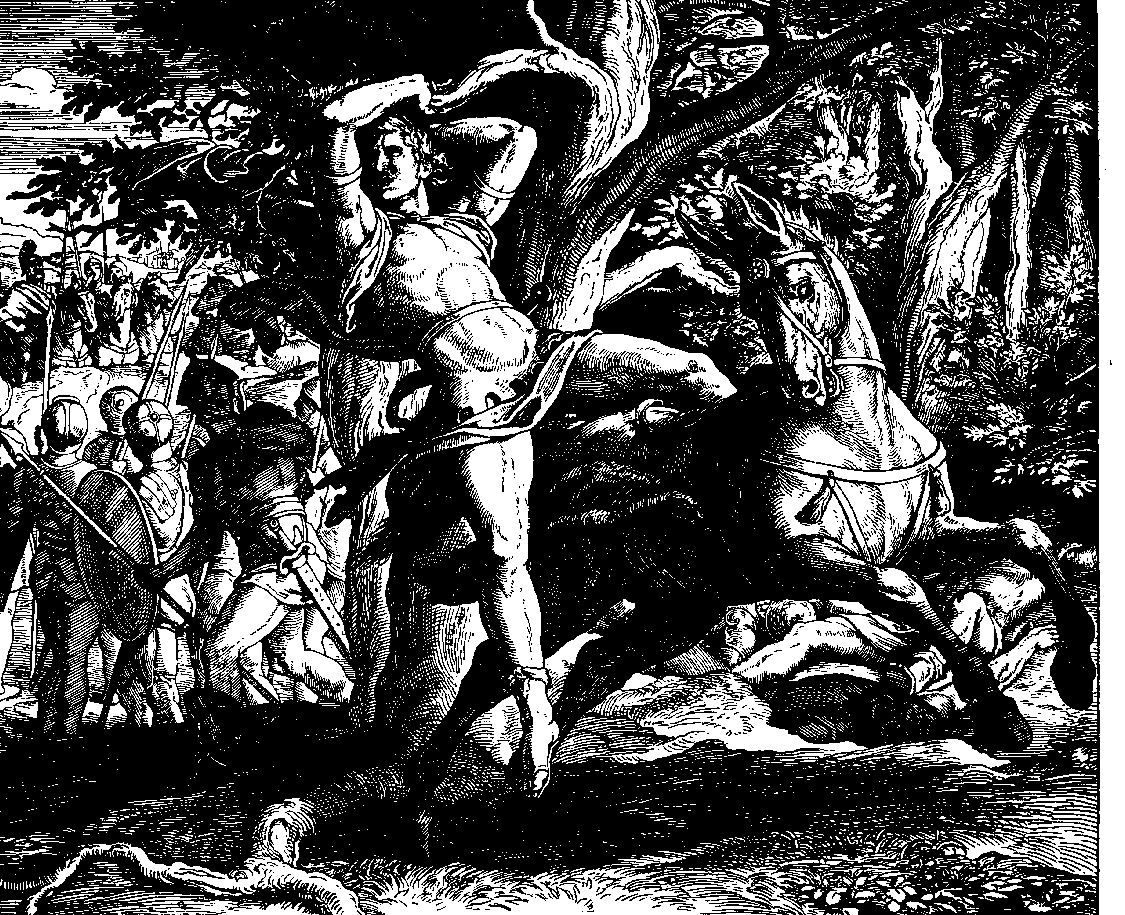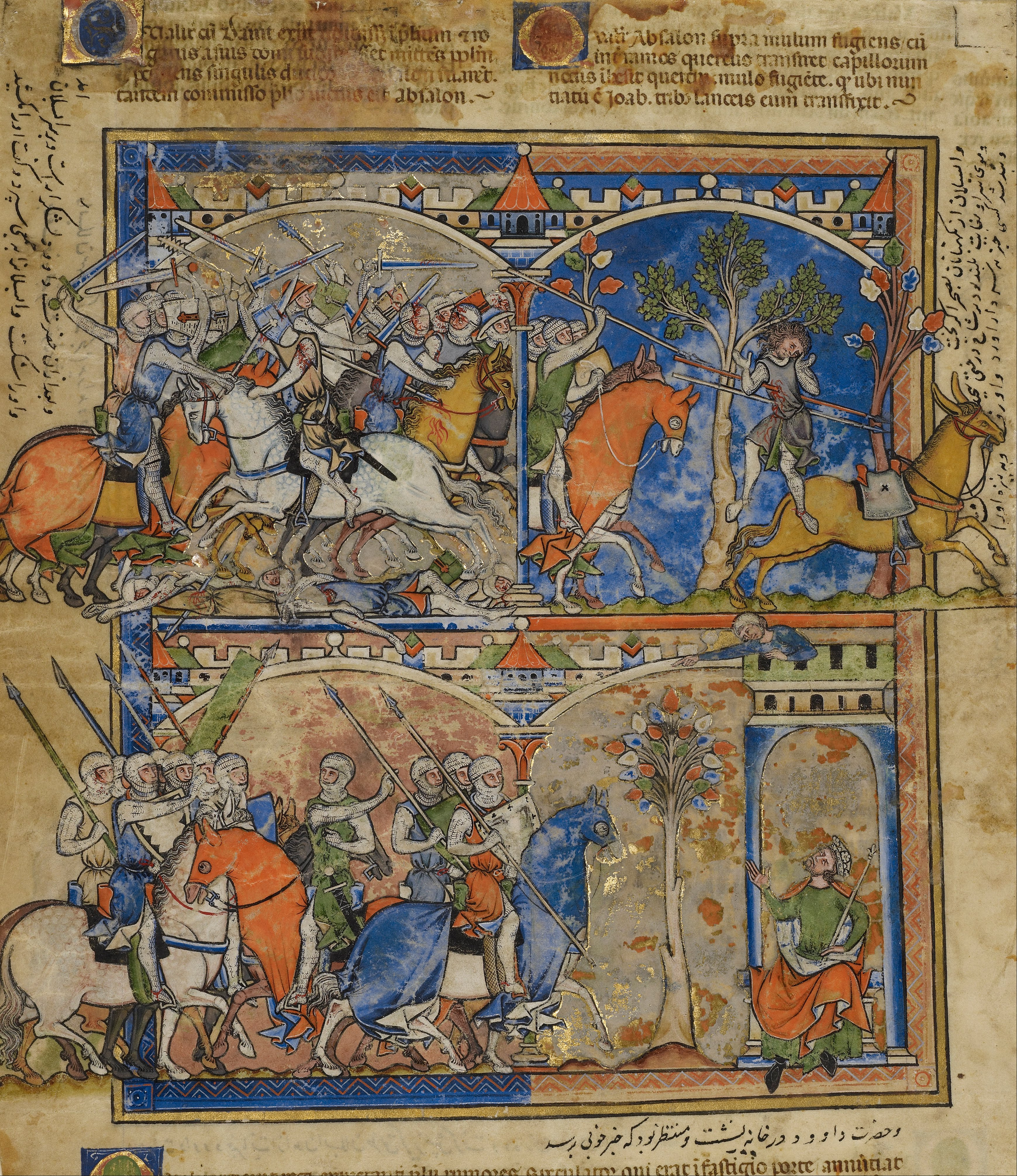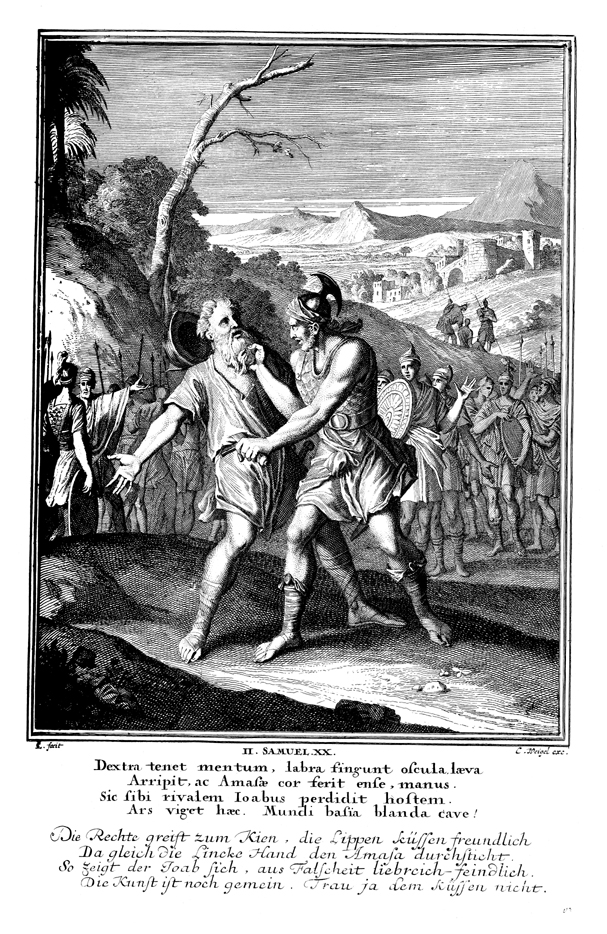1. Name
The name Joab, like many other Hebrew names, is theophoric, meaning it incorporates a divine name. It is derived from YHVH (יהוהYHWHHebrew), the name of the God of Israel, and the Hebrew word 'av' (אָבavHebrew), meaning 'father'. Therefore, the name Joab signifies 'YHVH [is] father' or 'Yahweh [is] father'. This name was not unique to David's commander; other individuals named Joab appear in the Bible, such as in the Book of Ezra (Ezra 2:6, 8:9), and it remains a common name among modern Israelis. Some interpretations also suggest a possible connection between the name "Joab" and the region of Moab, located east of the Jordan River, known as the homeland of Ruth from the Book of Ruth.
2. Life
Joab's life was intertwined with the reign of King David, serving as his chief military commander through numerous campaigns, rebellions, and political maneuvering. He demonstrated both profound loyalty and a pragmatic, often ruthless, approach to securing David's throne and his own position.
2.1. Early Life and Family Connections
Joab was the son of Zeruiah, who was a sister of King David. His father, according to the historian Josephus in his work Antiquities of the Jews, was named Suri. Joab had two brothers, Abishai and Asahel, both of whom were also notable figures in David's military. His military career began to gain prominence in early conflicts, notably appearing in the Battle of Gibeon against the forces of Ish-Bosheth, Saul's son. It was during this battle that his brother Asahel was killed by Abner, the commander of Ish-Bosheth's army, setting a precedent for Joab's future actions driven by vengeance.
2.2. Rise to Commander of David's Army
Joab's ascension to the chief commander of David's army was a direct result of his military prowess and leadership. After Joab successfully led the assault on the formidable fortress of Mount Zion, leading to its capture and transformation into the City of David in Jerusalem, David appointed him as the captain of his army. This appointment is recorded in various biblical texts, including 2 Samuel 8:16, 20:23, 1 Chronicles 11:4-6, 18:15, and 27:34, cementing his pivotal role in David's military and the establishment of the United Kingdom of Israel.
2.3. Major Military Campaigns and Actions
As commander-in-chief, Joab led numerous principal military operations and battles that were crucial to David's expansion and consolidation of power. He led the Israelite army against various foreign nations, including Aram (also known as Syria), Ammon, Moab, and Edom, defeating their forces and expanding the territory and influence of the United Kingdom of Israel. Beyond these military achievements, Joab was also involved in several highly controversial and morally ambiguous actions that cast a shadow on his otherwise impressive military career.
2.3.1. Killing of Abner

The assassination of Abner, the commander of Ish-Bosheth's army, stands as one of Joab's most controversial acts. Abner had killed Joab's brother, Asahel, in combat during the Battle of Gibeon. While 2 Samuel 3:27 and 3:30 explicitly state that Joab and his brother Abishai killed Abner to avenge Asahel's blood, there are differing accounts regarding the motivations.
The biblical narrative emphasizes Joab's act of revenge, which occurred despite King David's wishes and very shortly after David and Abner had secured peace between the House of David and the House of Saul. David had been negotiating with Abner for the unification of Israel, and Abner had even granted David control over the Tribe of Benjamin. Upon hearing of Abner's death, David publicly expressed his grief and condemned Joab's actions, even pronouncing a curse upon Joab and his house, underscoring the severity of the deed.
However, Josephus, in his Antiquities of the Jews (VII, 1, 3), presents an alternative perspective. According to Josephus, Joab had initially forgiven Abner for Asahel's death, acknowledging that Abner had slain Asahel honorably and in self-defense during combat, even after Abner had warned Asahel twice. Josephus argues that Joab's true motive for killing Abner was not revenge, but rather a fear that Abner, having switched allegiance to David and gaining significant influence, would become a threat to Joab's own position as commander of the army. This interpretation suggests political ambition rather than pure vengeance as the primary driver for Joab's actions.
2.3.2. Role in Uriah's Death
Joab was deeply implicated in one of King David's most notorious misdeeds: the orchestrated death of Uriah the Hittite. When David desired Uriah's wife, Bathsheba, David sent Uriah to the battlefield and instructed Joab to place Uriah in the most dangerous position, where he was sure to be killed. Joab faithfully executed David's command, ensuring Uriah's demise in battle (2 Samuel 11:14-25). This act allowed David to take Bathsheba as his wife, demonstrating Joab's willingness to collude with the king in morally questionable affairs to serve the king's desires, even if it meant sacrificing an innocent man.
2.3.3. Suppression of Absalom's Rebellion


Joab played a critical role in suppressing the rebellion led by Absalom, one of King David's sons. Absalom's revolt gained significant support across Israel, forcing David to flee Jerusalem with only his most trusted men. Despite the grave threat, David held a deep affection for Absalom and gave his commanders a direct order not to harm his son during the ensuing battle.
However, when Absalom was found alive, entangled by his hair in a tree, Joab defied David's clear instructions. Recognizing the immediate threat Absalom posed to David's reign and the stability of the kingdom, Joab, with the help of his men, killed Absalom (2 Samuel 18:1-33). This act, while perhaps strategically sound in ending the rebellion swiftly, was a direct insubordination that deeply grieved David.
Upon hearing of David's profound sorrow over Absalom's death, Joab confronted the king. He admonished David for prioritizing his personal grief over the morale of his loyal troops, who had risked their lives to save his kingdom. Joab sternly advised David to make a public appearance to encourage his forces, warning that if he did not, the troops would abandon him. David heeded Joab's advice, appearing publicly to greet his army, which ultimately re-energized his forces and helped stabilize his return to the throne.
2.3.4. Killing of Amasa

Following Absalom's rebellion, David appointed his nephew Amasa as the new commander of the army, intending to replace Joab. However, Joab soon assassinated Amasa. This event occurred during the suppression of Sheba's Rebellion, when Joab and his brother Abishai were pursuing Sheba, who had led another revolt against David.
At Gibeon, Joab met Amasa and, feigning a greeting, took Amasa by the beard as if to kiss him, and then fatally stabbed him in the stomach without Amasa realizing Joab's treacherous intent (2 Samuel 20:8-13; 1 Kings 2:5). The biblical narrative describes this act as another major transgression, alongside the killing of Abner. Like Abner, Amasa was a commander whom Joab perceived as a threat to his position and influence within David's military hierarchy.
2.4. Relationship with King David
The relationship between Joab and King David was remarkably complex, characterized by a mix of profound loyalty, strategic disagreements, and underlying tension due to Joab's ruthless actions. Joab was undeniably loyal to David and dedicated to the success of his kingdom. He served as David's most trusted military leader, consistently leading his armies to victory and playing a crucial role in securing David's throne against various enemies and rebellions.
However, Joab often operated outside of David's direct command or moral standards. His assassinations of Abner and Amasa, driven by personal vendetta or political ambition, directly contradicted David's desires for peace and reconciliation. David himself cursed Joab for shedding innocent blood, and the memory of these deeds weighed heavily on the king. Similarly, Joab's decision to kill Absalom, despite David's express order to spare his son, highlighted Joab's pragmatic and often brutal approach to leadership, prioritizing the stability of the kingdom over David's personal sentiments.
Despite these significant transgressions, David continued to rely on Joab's military expertise. Joab also demonstrated his influence over David, as seen when he confronted the king after Absalom's death, admonishing him to show leadership to his grieving troops. Joab also questioned David's judgment regarding the controversial census of Israel, indicating his willingness to voice dissent. This dynamic showcased Joab's indispensable value to David as a military commander, even as he remained a constant source of moral and political discomfort for the king.
2.5. Later Life and Death
In King David's later years, the issue of succession became critical. Joab made a significant political misstep by supporting Adonijah, David's eldest living son, as the rightful heir, aligning himself with the priest Abiathar. This move put him in direct opposition to David's chosen successor, Solomon, who was supported by the prophet Nathan and David's wife Bathsheba. When David swiftly acted to enthrone Solomon, Adonijah's supporters scattered.
Fearing Solomon's retribution, Joab fled to the Tabernacle of the Lord, seeking refuge by grasping the horns of the altar, a traditional place of asylum. However, David, on his deathbed, specifically instructed Solomon to ensure Joab's death, citing Joab's past betrayals and the innocent blood he had shed, particularly the murders of Abner and Amasa. David explicitly stated that Joab should not be allowed to "go down to the grave in peace," emphasizing the lasting stain of his actions.
Solomon, honoring his father's final wishes and recognizing Joab's past deeds as threats to his own reign (especially Joab's support for Adonijah), ordered Benaiah, the son of Jehoiada, to execute Joab. Benaiah pursued Joab to the Tabernacle. When Benaiah commanded Joab to come out, Joab refused, stating he would die there. Benaiah then killed Joab at the altar, executing him for the crimes committed without David's full knowledge or consent. Joab was subsequently buried at his own house in the wilderness. Following Joab's death, Benaiah was appointed as the new commander of the army, taking over Joab's position.
3. Assessment and Legacy
Joab's legacy is complex, characterized by both exceptional military achievements and a controversial record of ruthless and often insubordinate actions. His life continues to be a subject of historical and theological evaluation, reflecting the multifaceted nature of his character.
3.1. Positive Appraisal and Achievements
Joab is widely recognized as a highly skilled military strategist and a courageous warrior. His leadership was instrumental in David's numerous military victories, which were critical to the establishment and maintenance of the United Kingdom of Israel. He led David's forces in campaigns against formidable enemies such as Aram, Ammon, Moab, and Edom, successfully expanding and securing Israel's borders. His decisive actions, even if morally ambiguous at times, often served the pragmatic interests of the kingdom, as seen in his swift suppression of Absalom's rebellion, which, despite David's grief, effectively ended the civil war and restored stability. The ATS Bible Dictionary describes Joab as "a valiant warrior, and an able general; and his great influence on public affairs was often exerted for good, as in the rebellion of Absalom." He was an indispensable asset to David's reign, allowing the king to focus on political and religious matters while Joab handled the often brutal realities of warfare and security.
3.2. Criticisms and Historical Interpretations
Despite his military brilliance, Joab faces significant criticism for his often ruthless, imperious, and unscrupulous actions. The most prominent examples are his assassinations of Abner and Amasa. These killings were carried out without David's approval, driven by personal vendetta or political ambition, and were explicitly condemned by David himself, who pronounced a curse upon Joab for shedding innocent blood. David, on his deathbed, even instructed Solomon to execute Joab for these past transgressions, particularly noting that Abner and Amasa were "two men more righteous and better than he." Solomon later justified Joab's execution by stating that the guilt for their blood should rest upon Joab and his descendants forever.
Moreover, Joab's defiance of David's direct order to spare Absalom, though perhaps strategically expedient, highlighted his willingness to undermine royal authority when he deemed it necessary. The Korean source also notes his refusal to obey David's census command. Josephus's interpretation of Abner's death, suggesting it was driven by Joab's fear for his position rather than pure revenge, further emphasizes a darker, politically self-serving aspect of his character. These actions portray Joab as a formidable but morally compromised figure whose legacy is perpetually debated between his invaluable contributions to David's kingdom and the ethical dilemmas posed by his brutal methods.